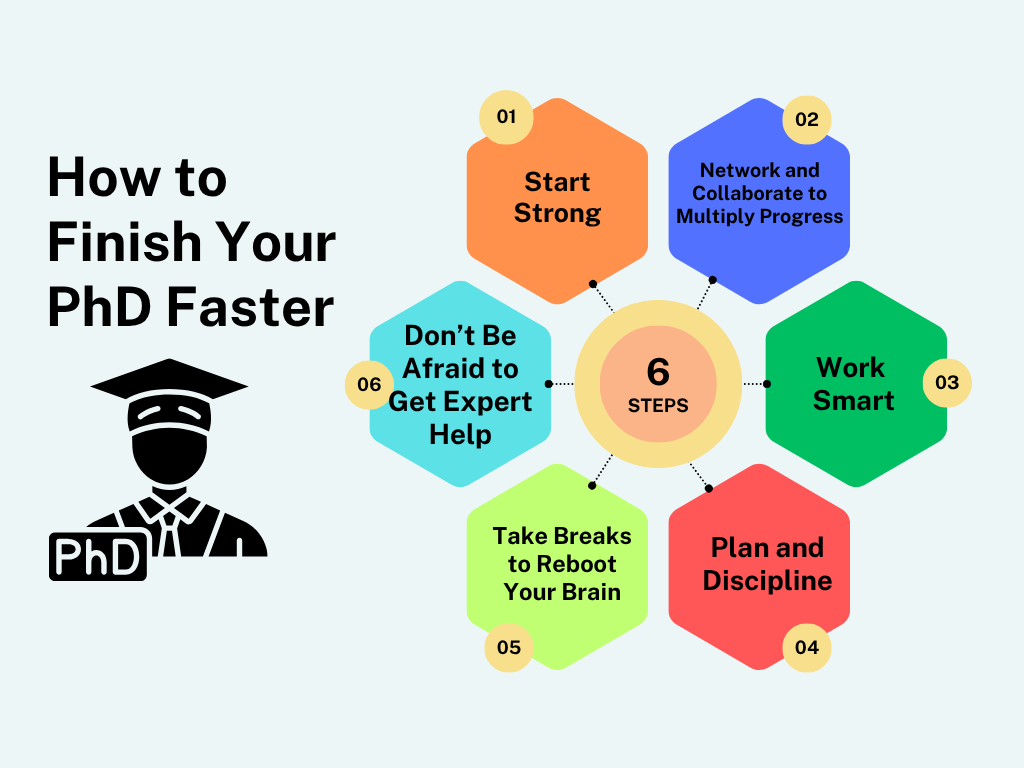
2025 Guide for Smart Researchers
Getting a PhD is one of the most intellectually rewarding—but also most challenging—journeys in academia. If you’re wondering how to finish your PhD faster without compromising quality, you’re not alone.
In 2025, speed and efficiency in academic research matter more than ever. Between tight deadlines, mental burnout, and unclear academic expectations, it’s easy to feel stuck. This comprehensive guide will give you actionable, research-backed tips to complete your PhD faster, smarter, and with confidence.
✅ Table of Contents
🎯 Start Strong: Determination Is Your Foundation
The first step is always the hardest. Most PhD students feel overwhelmed after their first thesis meeting.
Questions like:
-
“What’s your theoretical contribution?”
-
“Which model or framework are you applying?”
can leave you speechless.
But here’s the truth: You don’t need to have all the answers right away. What you do need is the mindset to figure it out.
What You Can Do:
-
Write down your long-term and short-term research goals.
-
Ask your supervisor for reading recommendations in your field.
-
Break down each question into subtopics and learn one step at a time.
-
Stay consistent. Consistency beats motivation.
Remember: The beginning is not about perfection, it’s about direction.
🌐 Network and Collaborate to Multiply Progress
Doing a PhD doesn’t have to be lonely. In fact, isolation is one of the top reasons students delay or drop out.
Why Networking Helps:
-
You get fresh perspectives and feedback.
-
Peers may point out gaps you missed in your research.
-
You can discover new methods, software, or resources faster.
-
Conferences and webinars build your academic brand and visibility.
Where to Build Your Academic Network:
-
LinkedIn academic groups
-
ResearchGate and Academia.edu
-
PhD support forums (e.g., r/PhD on Reddit)
-
Your university’s journal clubs or writing groups
🧠 Work Smart: Use Tools, Shortcuts, and Strategy
PhD success in 2025 isn’t just about working hard—it’s about working smart with AI-powered tools, academic networks, and shortcuts.
Smart Shortcuts for PhD Research:
-
Contact authors directly: Use their email to request papers behind paywalls.
-
Use AI summarizers: Tools like ChatGPT, Elicit, and ResearchRabbit can help you review papers faster.
-
Reference managers: Mendeley, Zotero, or EndNote organize your citations and generate bibliographies automatically.
🚀 Don’t reinvent the wheel. Use the tools already available to speed things up.
Must-Use AI Tools (2025):
| Tool | Purpose |
|---|---|
| Elicit.org | Automated literature review |
| Connected Papers | Visualize related research |
| Grammarly Premium | Academic writing clarity |
| Scrivener | Thesis chapter organization |
| ChatGPT | Brainstorming, writing drafts, summarizing |
📅 Plan and Discipline: Time Blocks Are Game Changers
Without a plan, it’s easy to waste months and feel “busy” without progress.
Create a Weekly PhD Workflow:
-
Monday: Literature review & note-taking
-
Tuesday: Writing (2 hours focused time)
-
Wednesday: Supervisor communication & planning
-
Thursday: Data analysis or experiments
-
Friday: Chapter revision or backup
-
Weekend: Relax or optional reading
Use techniques like:
-
Pomodoro Method (25 min focused work + 5 min break)
-
90-minute deep work sprints
-
Trello or Notion boards to track tasks
📈 Discipline makes progress visible.
🧘 Take Breaks to Reboot Your Brain
Yes, it’s possible to overwork yourself into a creative block. That’s why breaks and fun are not optional—they’re essential.
When to Take a Break:
-
You’re reading the same sentence 5 times.
-
You’ve written one paragraph in 3 hours.
-
You’re feeling anxious or irritable.
Best Ways to Relax:
-
Take a walk in nature
-
Listen to calming music or a podcast
-
Do short meditations or light yoga
-
Spend time with friends/family
✨ Creative breakthroughs often come when you stop overthinking.
💡 Don’t Be Afraid to Get Expert Help
If you feel overwhelmed, lost, or just need direction—you are not failing. Every great researcher knows when to seek support.
Why Use PhD Help Services:
-
Experts know what reviewers and universities expect.
-
You save months of trial and error.
-
You get clarity on research gaps, frameworks, and methodology.
Projectsdeal is one of the most trusted PhD proposal and thesis writing services with:
-
Expert guidance from PhD holders
-
Customized, plagiarism-free work
-
Support at every stage: proposal, literature review, data analysis, and defense prep
🎓 Smart researchers outsource confusion and focus on creation.
🛠 BONUS: Latest Tools and AI Resources for PhD Students
2025 has brought powerful new tools for researchers. Use them to get ahead.
| Tool | Function | Free/Paid |
|---|---|---|
| Scite.ai | Smart citation insights | Free |
| Perplexity AI | Research + source linking | Free |
| Notion AI | Organize research, summarize content | Paid |
| Scrivener | Thesis organization and planning | Paid |
| Hemingway Editor | Improve clarity and readability | Free |
✅ Conclusion: Fast PhD Completion = Smart Strategy + Support
Finishing your PhD faster doesn’t mean cutting corners—it means managing time, effort, and resources wisely. Stick to a strategy that blends:
-
Determination
-
Discipline
-
Smart research tactics
-
The right tools
-
Support from experts when needed
🎓 Let Projectsdeal be your trusted academic partner on this journey—from PhD proposal writing to final thesis submission.
📢 Call to Action: Ready to Finish Faster?
Visit Projectsdeal.co.uk and let us help you fast-track your PhD success in 2025. Whether you’re struggling with your proposal or need expert editing — we’re here for you.
📲 Chat with us directly on WhatsApp: +44-7447-882377
Available 24/7 for instant academic support.